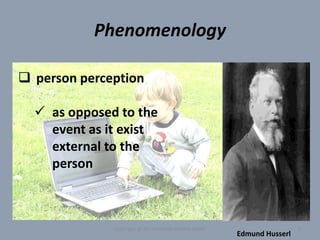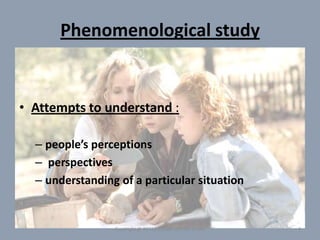Phenomeological Study
- 1. Phenomeological studyas a QUALITATIVE RESEARCH methodology1Anadolu UNIVERSITYeduCopyright @ 99718003366 DRITAN GASHI
- 3. as opposed to the event as it exist external to the personCopyright @ 99718003366 DRITAN GASHI
- 4. Phenomenological studyAttempts to understand :people’s perceptions perspectivesunderstanding of a particular situation3Copyright @ 99718003366 DRITAN GASHI
- 5. PHENOMENOLOGICAL STUDY“METHOD”An unstructured Interview (participants –researchers) all of whom have had direct experience with the fenomenon1 to 2 hours lengthly
- 6. 5 to 25 individuals4Bracketing or epoché: - researchers must suspend any preconceived notions or personal experiences that may unduly influenceCopyright @ 99718003366 DRITAN GASHI
- 7. PHENOMENOLOGICAL STUDY“DATA ANALYSIS”Collecting common themes in people’s descriptions of their experiences5Copyright @ 99718003366 DRITAN GASHI
- 8. PHENOMENOLOGICAL STUDY“DATA ANALYSIS”After transcribing the interviews, the researchers typically takes the following stepsIdentify statements that relate to the topicGroup statement into “meaning units”Seek divergent perspectivesConstract a composite6Copyright @ 99718003366 DRITAN GASHI
- 9. PHENOMENOLOGICAL STUDY“DATA ANALYSIS”The final result: general description of the phenomenon as seen through the eyes of peopleThe focus is on common themes in the experience despite diversity in the individuals and setting studied.7Copyright @ 99718003366 DRITAN GASHI
- 10. PHENOMENOLOGICAL STUDY“THE RESEARCH REPORT” Present the research problem or question.
- 11. Describe the method of data collection and ananlysis
- 12. Draw coclusion of the phenomenon
- 13. Relate the findings to the existing body theory and research, and discuss the practical implications of the findings8Copyright @ 99718003366 DRITAN GASHI
- 14. Phenomenological study“I understand better what it is like for someone to experience that”9Copyright @ 99718003366 DRITAN GASHI
- 15. Phenomenological studyFor anything you do in a qualitative study, you must have a definite rationale and distinct purpose, and you must keep your overall goal—to answer your research question—clearly in sight at all times.Thank You for listening ...10Copyright @ 99718003366 DRITAN GASHI









